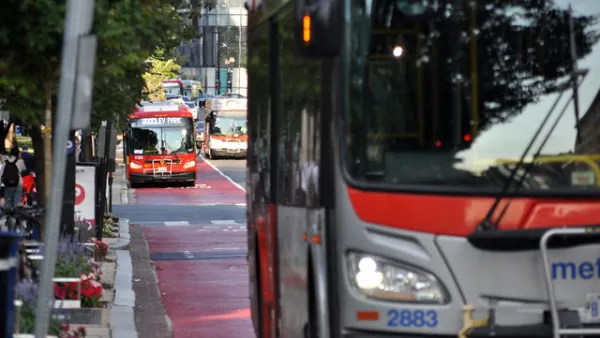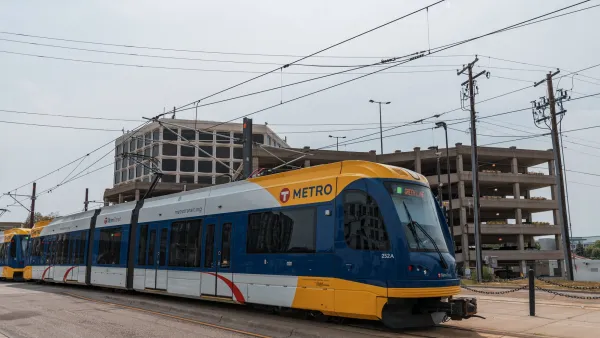Angie Schmitt takes issue with the controversial premise of a recent story from the popular Freakonomics guys. True to their reputation for counter-intuition, their most recent report makes the claim that "driving is greener than transit."

In a recent, attention-grabbing story for Marketplace, Stephen Dubner of Freakonomics fame explores what Schmitt contends is an "intellectually dishonest argument" about the relative environmental friendliness of driving a car versus taking public transit. Clemson University’s Eric Morris, a regular contributor to the program, walks Dubner through the argument for the benefits of the car based on per-passenger energy consumption.
As Schmitt explains, "Buses are potentially much more efficient than cars, Morris admits. But many buses are underutilized: The average bus carries just 10 passengers, while the average car carries 1.6. As a result, Morris says, those traveling by bus consume 20 percent more energy per passenger than people driving in cars."
While Schmitt seems to agree with Morris's assertion that "if we can persuade more people to leave cars and move onto the existing transit system that we already have, that's a complete win for the environment," she takes issue with his simplistic argument against building new transit in places like Cleveland, Pittsburgh and Memphis.
"Clearly, many American cities need to repair decades’ worth of damage to the walkable urban fabric that makes transit efficient and well-used," says Schmitt. "They also need to build better transit so new walkable development can flourish."
"Dubner notes at the beginning that New Yorkers have the smallest per-capita carbon footprint in the United States, but he never fully explains why places with good transit like New York, Boston, and San Francisco also have some of the lowest energy consumption rates in the country. There’s no reason places like Cleveland, Pittsburgh, and Memphis can’t join them as green cities with great transit."
FULL STORY: Freakonomics Hucksters: “Save the Earth, Drive Your Car”

Analysis: Cybertruck Fatality Rate Far Exceeds That of Ford Pinto
The Tesla Cybertruck was recalled seven times last year.

National Parks Layoffs Will Cause Communities to Lose Billions
Thousands of essential park workers were laid off this week, just before the busy spring break season.

Retro-silient?: America’s First “Eco-burb,” The Woodlands Turns 50
A master-planned community north of Houston offers lessons on green infrastructure and resilient design, but falls short of its founder’s lofty affordability and walkability goals.

Test News Post 1
This is a summary

Analysis: Cybertruck Fatality Rate Far Exceeds That of Ford Pinto
The Tesla Cybertruck was recalled seven times last year.

Test News Headline 46
Test for the image on the front page.
Urban Design for Planners 1: Software Tools
This six-course series explores essential urban design concepts using open source software and equips planners with the tools they need to participate fully in the urban design process.
Planning for Universal Design
Learn the tools for implementing Universal Design in planning regulations.
EMC Planning Group, Inc.
Planetizen
Planetizen
Mpact (formerly Rail~Volution)
Great Falls Development Authority, Inc.
HUDs Office of Policy Development and Research
NYU Wagner Graduate School of Public Service



























